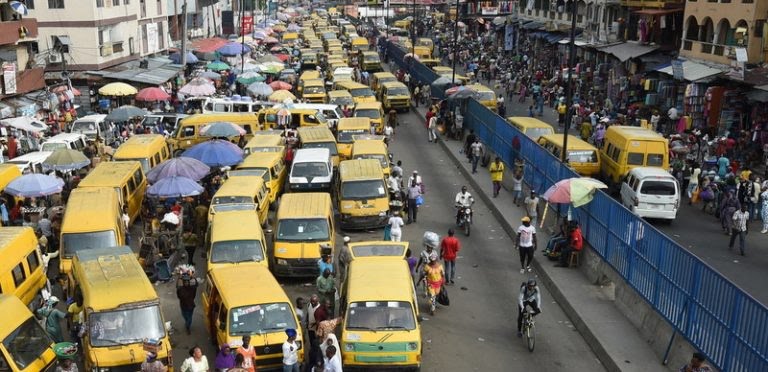Lagos ranks 133 in world’s most polluted cities — Report

Lagos State, Nigeria’s commercial capital and most populous state, has been ranked 133 in the world’s most polluted cities (historical data 2017-2022), according to a report by IQAir.
In its 2022 World Air Quality Report on most polluted city ranking which, according to IQAir, is based on annual average PM2.5 concentration (μg/m³), Lagos was said to be “experiencing some rather poor quality air with a US AQI figure of 160 which classified it as ‘unhealthy’ according to recommended figures from the World Health Organisation” at the beginning of 2021.

The air quality index of Lagos
Lagos, with an estimated population of the metropolitan area was 21 million people as of 2018, has the concentration of its PM2.5 pollutant as 73.2 µg/m³.
“With a level such as this,” the report says, “it is recommended that a good quality mask is worn when going outside. Doors and windows should be kept closed so as to prevent the ingress of polluted air in the home. All types of outdoor exercise should be abandoned until air quality improves.”
The main source of air pollution in Lagos
According to IQAir, the major source of air pollution in Lagos comes from vehicle emissions, closely followed by industry and domestic energy use.
“Every day, 227 vehicles clog each kilometre of road. Most of these vehicles are over 15 years old and are not equipped with the latest emission technologies. The fuel they use has a very high sulphur content which is 200 times higher than U.S. standards for diesel,” the report says.
Industrial emissions are the second source of air pollution in the city of Lagos. Industrial and commercial zones such as Apapa, Idumota, Ikeja and Odogunyan, where cement, chemicals, furniture, oil refineries, steel processing industries are concentrated, have high levels of pollution.
“In Odogunyan, a PM2.5 concentration of 1,770 µg/m³ was recorded in a period of 24 hours,” it noted.
The report also noted that half of Lagos’ total energy needs are supplied by generators which are yet another source of air pollution. The poor combustion of the gasoline and oil used to power the generators pollutes the air and could cause huge health damage.
“The use of energy such as charcoal, wood and kerosene in cooking, makes the problem difficult in rural areas due to limited infrastructure and access to clean energy.”
The pollution level in Lagos
“According to a report, Nigeria is the 10th most polluted country in Africa, with an air pollution rate of 44.8 per cent, followed by Uganda and Ethiopia,” IQAir says.
In 2018, as a result of an intense study, it was estimated that over 11,200 premature deaths are the direct result of poor air quality. It was also discovered that 60 per cent of that figure was for children under the age of five years.
“Any type of air pollution is detrimental to health, but the worst type of pollutant is the microscopic PM2.5 particles which can easily penetrate the lungs, due to their small size. This study found the levels in Lagos were over 7 times the target figure suggested by the World Health Organisation,” according to IQAir.
Is air pollution in Lagos getting better or worse?
According to the report, more people die from air pollution than unsanitary hygiene practices and malnutrition. “Casualties as a result of the air pollution crisis in Nigeria has increased by nearly 40 per cent over the last few decades. Nigeria has some of the highest levels of unhealthy air quality across the African continent. Overall, Nigerian cities contain the most unhealthy air quality with 10 urban areas being classified on a list of 30 cities in Africa with the most unhealthy air quality,” it says.
What can be done to improve the air quality in Lagos?
In order to handle the air pollution crisis in Nigeria effectively, the report recommends regular inspections of automobiles to ensure that older cars are not releasing harmful chemicals into the atmosphere. It adds that Nigeria must remove cars that are toxic to the environment from the road.
“The introduction of efficient electric energy will decrease the need for generators, which produce unhealthy air in households and work environments. Nigeria has access to sustainable energy resources that are capable of providing power to its citizens. These methods are safer for the environment and the usage of them decreases the use of gasoline-powered generators, thus decreasing pollution,” it states.
“In rural areas, Nigerians can reduce air pollution in the household by substituting fuelwood, coal and charcoal for biogas, which is a form of biofuel that is made from the decay of natural waste. Biogas will provide sustainable options for preparing food and heating the household at the same time eliminating air pollution both inside the household and the outside environment.
“Lagos is making some progress in introducing laws but they still need to be executed. In 2017, standards for sulphur content in fuel were lowered to reduce emissions: from 3,000 parts per million (ppm) to 50 ppm for diesel; and from 1,000 ppm to 150 ppm for gasoline.
“Emissions from industries could be lowered with the use of newer, better technologies such as solar power. The garbage situation needs to be addressed due to the huge amount of rubbish that is buried, burned or just dumped. Teams need to monitor this situation and act accordingly when the perpetrators are caught. Much of the plastic could be recycled instead of being burnt as it is now. Furthermore, daily waste removal from households would also help to properly dispose of garbage, which reduces the fragmentation of waste and prevents odours forming that contribute to air pollution,” according to the report.
Effects of breathing Lagos poor quality air
The report notes that “Ambient air pollution is caused by pollutants such as nitrogen oxides (NOx), sulphur dioxide (SO2), ozone (O3) and fine particulate matter with an aerodynamic diameter of less than 2.5 micrometres or PM2.5. These are dangerous because they can easily bypass the body’s natural defence system and enter the bloodstream, contributing to mortality and morbidity. While the WHO guideline for the annual mean PM 2.5 concentration level is 10 µg/m³, Lagos has recorded levels of 68 µg/m³ in the same range as other polluted megacities such as Beijing, Cairo and Mumbai.”









